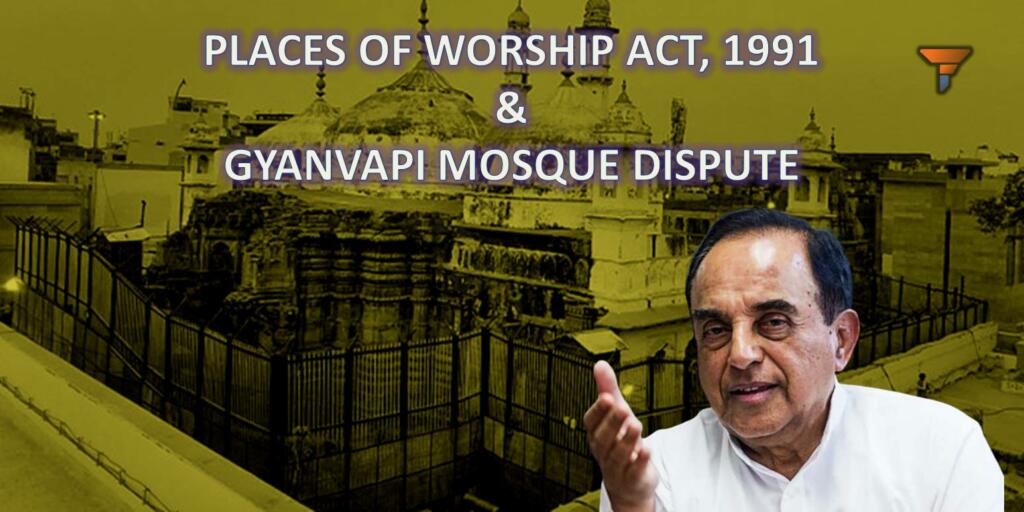Subramanian Swamy has a tiff with the BJP and the Modi government, and this is becoming totally clear now. However, Subramanian Swamy’s latest jibe at the Modi government may have backfired on him. Ever since the Gyanvapi Mosque controversy came into the spotlight, the entire nation seems to be discussing the Places Of Worship (Special Provisions) Act, 1991. And now it has snowballed into a political controversy involving Subramanian Swamy and the BJP leadership.
What are the Places
With the exception of the Ram Janmabhoomi dispute, the legislation froze the status quo of all other places of worship as of August 15, 1947. Therefore, even if a place of worship was destructed, vandalised, desecrated, or suffered any damage of a like kind and was subsequently converted in terms of “religious character”, before the cut-off date, viz. August 15, 1947, such a place of worship would retain its altered religious character.
Now, the Act has become a source of embitterment between Swamy and the BJP.
Swamy takes a jibe at PM Modi
Talking about the Places Of Worship Act, 1991, Subramanian Swamy said, “Even after 8 years as PM with absolute majority in Lok Sabha and de facto majority in Rajya Sabha, Modi has failed to withdraw the 1991 Places of Worship Act by moving Parliament for its deletion. It was expected of him.”
Even after 8 years as PM with absolute majority in Lok Sabha and de facto majority in Rajya Sabha, Modi has failed to withdraw the 1991 Places of Worship Act by moving Parliament for its deletion. It was expected of him.
— Subramanian Swamy (@Swamy39) May 19, 2022
Swamy was thus trying to corner the BJP over the controversial legislation that was enacted by the Narsimha Rao government over three decades ago.
Read more: Places of Worship Act needs to go and the push needs to come from the government
However, the history tells us that it is the BJP that has stood up against the contentious legislation and Swamy, on the other hand, doesn’t have a great past on the issue.
When Uma Bharti flagged Gyanvapi issue and Subramanian Swamy supported the Places of Worship Act
Historical records show that when the Places of Worship legislation was brought to the Parliament, it was veteran BJP leader L.K. Advani who opposes it and led the party’s walkout from the Lok Sabha.
Uma Bharti, then Lok Sabha MP from Khajuraho, had said, “I heard in childhood that pigeons fear the presence of cats. Pigeons are so innocent they believe mere closing of eyes will prove to be an effective shield against cats. But this is not correct. Maintenance of status quo as in 1947 in respect of religious places, is like closing eyes similar to that of pigeons against advancement of cats. This maintenance of the status quo of 1947 will mean preservation of tension for the coming generations.”
Talking about the Gyanvapi Mosque, she said, “Twenty days ago, I went to Varanasi to visit Gyanvapi… I saw the mosque built on the remnants of the temple, some sort of current of anger ran through my body. I felt disgraced at the fate of my ancestors, who I think were challenging my womanhood and asking me, whether the intention of Aurangzeb was merely to build a mosque, then why were remnants of the temple left.”
Swamy, who was then a Rajya Sabha MP, had however supported the bill. He had said, “this Bill has been essentially brought because of the BJP and for the BJP. Had it been known in 1947 that such a situation is going to arise after 44 years, I am sure, such an enactment would have been passed in 1947 itself. It has come today because the issue has been raised now.”
Talking about the Ram Janmabhoomi dispute, he had said, “In fact the original FIR was launched by none other than a constable by name Ram Singh and he describes vividly, in what a sneaky manner the idols and the pictures were brought into the Masjid and since then there has been a dispute.”
Today, Subramanian Swamy is critical of the BJP for not repealing the Places of Worship Act, 1991. Yet, he himself has supported the legislation when it was being imposed on the nation.
